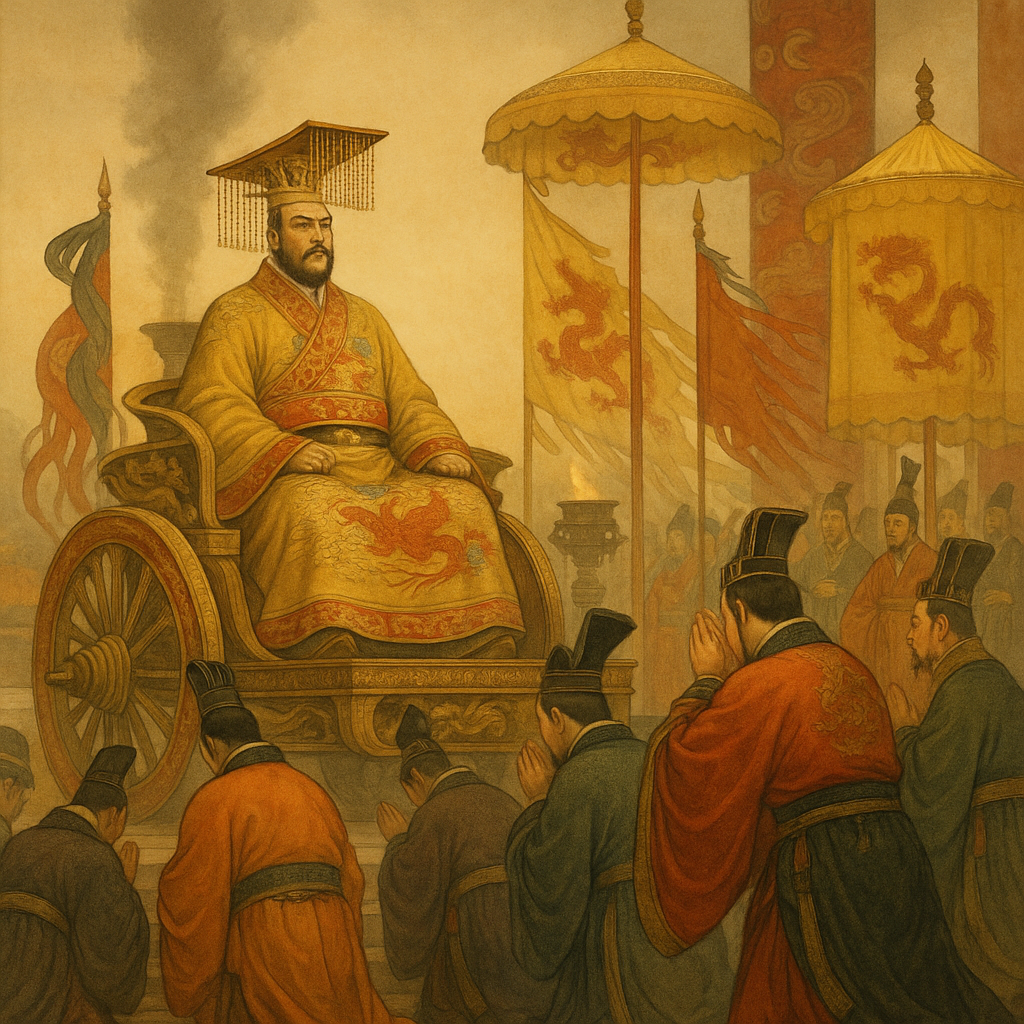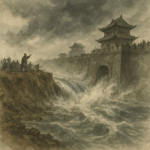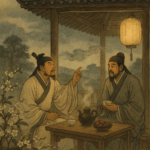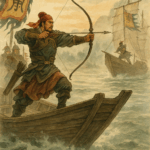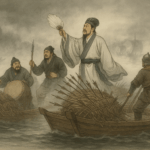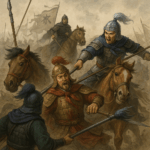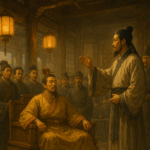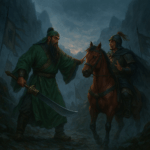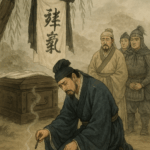Yuan Shu, ruling over Huainan’s fertile lands, grew greedy upon possessing Sun Ce’s jade imperial seal. He resolved to usurp the throne. Summoning all his ministers, he proclaimed: “In the past Emperor Gaozu of Han was but a mere district chief at Sishui, yet he unified all under heaven. Now, four centuries later, the mandate of Han wanes and the realm is in chaos. My family has held high office for four generations; the people look to us. I follow Heaven’s will to restore order and am fit for the Ninefold Throne. What say you?”
But his secretary Gexiang remonstrated: “Impossible. Even the great Zhou dynasty, after generations of virtue, could only claim two-thirds of the realm under King Wen—and still served the Shang. Though your house is noble, it lacks Zhou’s glory; though Han is declining, it has not sunk to the tyranny of the last Shang king. You must abandon this scheme.”
In fury, Yuan Shu thundered, “My surname descends from the House of Chen—heirs of the sage-ruler Shun. Earth assumes Fire’s mantle in the Five-Element cycle, and in prophecy ‘he who replaces Han will ascend the heights.’ My courtesy name is Gonglu—‘High Road’—in perfect accord with that oracle. Possessing the imperial seal, to refuse the throne would defy Heaven itself! My resolution stands: speak of this again and be executed!”
He adopted the dynastic title “Zhongshi,” created new court offices, rode in a dragon-phoenix chariot, performed sacrifices at the north and south altars, appointed Feng Fang’s daughter as Empress and his own son as Crown Prince. He then dispatched envoys to fetch Lü Bu’s daughter as Crown Princess—only to learn that Lü Bu had already sent Han Yin back to Xuchang, where Cao Cao had executed him. In rage, Yuan Shu elevated Zhang Xun to Grand General, mustered over two hundred thousand troops, and divided them into seven armies to march on Xuzhou:
- Zhang Xun commanded the center.
- Qiao Rui the left wing.
- Chen Ji the right wing.
- Lei Bo the left flank.
- Chen Lan the right flank.
- The defected Han Xian the left rear.
- The defected Yang Feng the right rear.
Each column numbered in the tens of thousands, and Jin Shang, Inspector of Yanzhou, was named Grand Commandant to oversee grain and treasure—an office he refused, earning execution. Yuan Shu made Ji Ling Supreme Coordinator of all seven routes and personally led thirty thousand crack troops, flanked by envoys Li Feng, Liang Gang, and Le Jiu to hasten the columns’ advance.
Lü Bu’s Counsel and the Banquet of Peace
Lü Bu learned that Zhang Xun would advance on Xuzhou by the main road, Qiao Rui on Xiaopei, Chen Ji on Yidu, Lei Bo on Langya, Chen Lan on Jieshi, Han Xian on Xiapi, and Yang Feng on Junshan—seven armies pillaging the countryside day and night. Alarmed, he convened his advisers: Chén Gōng and Chén Guī arrived. Chén Gōng said, “The disaster in Xuzhou springs from Chén Guī and his son—in flattering Yuan Shu they sought rank at our expense. We should behead the two of them and offer their heads to Yuan Shu; his army will surely pull back.”
Lü Bu seized and bound both Chén Guī and Chén Dēng. But Chén Dēng laughed: “Your scheme is feeble! Do you think seven routes of soldiers are but rotting grass? I have other plans that will not only secure Xuzhou but also capture Yuan Shu himself.”
Lü Bu challenged, “Speak them!” Chén Dēng advised: “Yuan Shu’s troops are undisciplined and distrustful. We can hold our front lines, then strike with an elite corps at a decisive point. Better still, we can enlist Han Xian and Yang Feng—former Han officials forced to join Yuan Shu because they feared Cao Cao. He will despise them, and they will not serve him gladly. If we send each a secret letter pledging them clemency and promise Liu Bei as an external ally, they will betray Yuan Shu from within—and we will seize him.”
Impressed, Lü Bu sent Chén Dēng with a small escort to carry letters to Han Xian and Yang Feng. First Chén Dēng rode to Xiapi, taking up quarters on the road. When Han Xian received him he asked, “What business brings you, a man of Lü Bu’s camp?” Chén Dēng replied, “I am a minister of the Han dynasty, no mere vassal of Lü Bu. You once served the imperial court; now as a subject of a rebel, your honor is lost. Yuan Shu’s jealousy will soon consume you. If you do not act now, you will have no refuge!”
Han Xian sighed, “I have long wished to return to the Han, but saw no path.” Chén Dēng produced Lü Bu’s letter. After reading it, Han Xian agreed: “I will revolt against Yuan Shu at your signal. Let fire be the sign, and the Tiger Lord’s troops will join me.” Chén Dēng rode back and reported Lü Bu’s success.
Lü Bu’s Seven-Pronged Offensive
Lü Bu then dispatched five armies in counter-invasion:
- Gāo Shùn advanced on Xiaopei against Qiao Rui.
- Chén Gōng struck Yidu against Chen Ji.
- Zhāng Liáo and Zàng Bà attacked Langya against Lei Bo.
- Sòng Xiàn and Wèi Xù moved on Jieshi against Chen Lan.
- Lü Bu himself led the main force against Zhang Xun.
Each column numbered ten thousand, while garrisons held the city. They encamped thirty li outside Xuzhou. Zhang Xun, expecting only Lü Bu’s force, pulled back twenty li to await the other columns.
That night, at the second watch, Han Xian and Yang Feng set dozens of fires around Zhang Xun’s camp, signaling Lü Bu’s advance. Zhang Xun’s army panicked; Lü Bu poured in and routed them. At dawn he met Ji Ling’s detachment and before they could form battle lines, Han Xian and Yang Feng struck from two flanks. Ji Ling’s host shattered as Lü Bu gave chase.
Yuan Shu’s Last Stand—and Flight
As Lü Bu pressed his pursuit, a third banner appeared on the ridge, bearing dragon and phoenix emblems and glittering halberds, led by Yuan Shu himself, clad in gold armor with twin swords at his belt. He roared, “Lü Bu, traitor’s slave!” In furious shock Lü Bu spurred forward. Yuan Shu rode out Li Feng to meet him—only to see Li Feng’s blade shattered by Lü Bu’s lance. Yuan Shu’s army broke and fled in disarray.
Pursuing them for miles, Lü Bu seized countless horses and arms. Yuan Shu’s army finally came to halt, desperate, before a fourth banner swept out to cut off their retreat—this one led by none other than Guān Yúncháng (Guan Yu), shouting, “Rebel!” Yuan Shu’s remnants scattered.
Victorious, Lü Bu summoned Guan Yu, Yang Feng, and Han Xian, feasted them in Xuzhou, and generously rewarded his officers. The next day Guan Yu took leave. Lü Bu appointed Han Xian Governor of Yidu and Yang Feng Governor of Langya, but Chén Guī objected: “If you leave them here, within a year all of eastern China will fall under your banner.” Lü Bu agreed and stationed both as frontier garrisons, awaiting further imperial commands.
Yuan Shu’s Despair and Sun Ce’s Alliance with Cao Cao
Yuan Shu, defeated, sent envoys to Jiangdong asking Sun Ce for troops. Enraged, Sun Ce replied, “You used my jade seal to proclaim yourself emperor, betraying the Han! I will not aid a rebel.” He burned Yuan Shu’s letter in anger.
On hearing this, Sun Ce mustered his forces at the river mouth. Unexpectedly, Cao Cao’s envoys arrived and appointed him Governor of Kuaiji. They ordered him to join the southern campaign against Yuan Shu. He agreed—but his adviser Zhang Zhao counseled caution: “Although Yuan Shu is weakened, his armies still number in the tens of thousands. Better to send a letter to Cao Cao urging him to press south while we hold the rear. If we suffer reverses, he can still come to our rescue.”
Sun Ce acceded and dispatched his envoy immediately.
Cao Cao’s Southern Expedition and Reunion with Allies
At Xuchang, Cao Cao held rites in honor of Dian Wei and enfeoffed Dian Wei’s son Dian Man as Central Officer. Then he received Sun Ce’s letter and, learning that Yuan Shu’s forces were raiding Chenliu, resolved to march south. He left Cao Ren to garrison Xuchang, and set out with 170,000 cavalry and infantry and over a thousand supply wagons.
He first moved to meet the alliance of Sun Ce, Liu Bei, and Lü Bu. At the border of Yuzhou, Liu Bei rode out with his host to greet him, presenting the severed heads of two traitors. Cao Cao asked, “Whose heads are these?” Liu Bei answered, “They are Han Xian and Yang Feng.” Cao Cao inquired, “How did you prevail?” Liu Bei explained how he lured them into a banquet, then ordered Guan Yu and Zhang Fei to strike when the cups were thrown—thus winning their entire command. Impressed, Cao Cao praised his achievement, merged their armies, and advanced upon Xuzhou.
The Siege of Shouchun and Its Aftermath
Yuan Shu’s vanguard under Qiao Rui—fifty thousand strong—met Cao Cao at the border of Shouchun. Qiao Rui charged Xiahou Dun, but was cut down after three blows. The vanguard collapsed and retreated within the city walls. Cao Cao himself attacked from the north, while Sun Ce struck from the west, Lü Bu from the east, and Liu Bei—flanked by Guan Yu and Zhang Fei—assailed from the south.
Yuan Shu’s defenders panicked, and his advisers urged: “Leave your stores and flee across the Huai. We cannot hope to withstand four fronts.” Yuan Shu took their advice, dividing ten thousand men under Li Feng, Le Jiu, Liang Gang, and Chen Ji to hold Shouchun, while he himself loaded his treasures onto boats and escaped south.
Cao Cao’s 170,000 men soon ran short of supplies; the surrounding counties were starving. He summoned provisions from Sun Ce—who lent him 100,000 dàn of grain—yet it barely sustained the army. With murmurs of discontent rising, his quartermaster Ren Jun pleaded, “My lord, with such numbers and so little food, we face revolt.” Cao Cao replied, “I have a plan.” He ordered Ren Jun to distribute the scant rations in small measures. The soldiers grumbled less when they saw their lord subject himself to the same regulation. Then Cao Cao had Ren Jun’s head displayed on a pike, proclaiming, “For misappropriating grain, I execute my own minister.” The grim justice restored discipline.
A Grim Resolve
Cao Cao then proclaimed, “If within three days you do not help take Shouchun, you all shall be executed.” He personally supervised the filling of the moat with earth and brush, and when two deputy commanders attempted to flee, he dragged them down and beheaded them. Stripped of their defenses, Shouchun’s walls fell, and Cao Cao’s columns poured in. Li Feng, Chen Ji, Le Jiu, and Liang Gang were captured and executed; the city was looted and burned.
He prepared to cross the Huai after Yuan Shu, but Xun Yu advised, “This year’s drought makes further campaigning unwise. Let us return to Xuchang and strike again when spring wheat is ripe.” Cao Cao hesitated—when he learned that Zhang Xiu, under Liu Biao’s protection, had rebelled in Nanyang. He sent a letter to Sun Ce to feign hostility and fix Liu Biao in place, then withdrew his main army to reassemble at Xuchang. He left Liu Bei garrisoned at Xiaopei in alliance with Lü Bu to guard the eastern flank: “I shall be your external ally.”
Revenge on Li Jue and Guo Si
Upon returning to Xuchang, Cao Cao heard news that Duàn Wēi had slain Li Jue, and Wǔ Xí had killed Guo Si, presenting their heads. Duàn Wēi also delivered Li Jue’s entire clan alive. Cao Cao ordered the executions, showering praise on Duàn Wēi and Wǔ Xí. The Emperor held a grand peace banquet, and Cao Cao nominated Duàn Wēi General Eradicator of Rebels and Wǔ Xí General Slayer of Foes, each to garrison Chang’an. They bowed low and departed in triumph.
Now, Cao Cao petitioned the Emperor to authorize a campaign against Zhang Xiu. The Emperor himself rode in the imperial carriage to see him off—this was summer of Jian’an Year Three. Cao Cao left Xuchang at once under Xun Yu’s counsel.
Protecting the Harvest
On the march, they passed ripening wheat fields. The peasants, fearing the armies, had fled and left the grain standing. Cao Cao issued a strict edict: “By imperial decree we end rebellion and protect the people. Yet if any soldier tramples these fields, even by accident, he shall be executed.” The villagers rejoiced, and the army respectfully parted the stalks as they rode by.
One day, as Cao Cao rode through the fields, a startled dove flushed upward, and his horse bolted, trampling a swath of wheat. He called his aide, lamenting, “I must punish myself for this.” When the official protested, Cao Cao said, “If the law spares the noble, I must apply it to myself.” He drew his own sword and cut off a lock of hair, scattering it on the ground: “Let this stand in for my head.” He ordered the lock displayed to the army, and his personal sacrifice shamed every soldier into strict obedience. As one poet later wrote:
Seventeen thousand warriors all their hearts unite,
Yet by one man’s decree they bend to serve his might.
He drew his sword and sacrificed a lock of hair,
His cunning seal, and all before his wisdom fared.
The Capture of Zhang Xiu
Zhang Xiu, learning of Cao Cao’s approach, notified Liu Biao and marched out with Lei Xu and Zhang Xian. Their hosts arrayed on the plain, Zhang Xiu charged Cao Cao, calling him a shameless tyrant. In anger Cao Cao sent Xu Chu forward; after three blows Xu Chu cleaved Zhang Xian’s head, shattering the rebel line. Pursued to Nanyang’s walls, Zhang Xiu barricaded himself behind a deep moat.
Cao Cao’s engineers labored for days to fill the fosse with earth and brush, erecting ladders and siege platforms. Zhang Xiu’s strategist Jia Xu warned, “Cao Cao now means to starve you out, but he fears fire. A well-timed ruse might drive him off.” Their plot unfolds in the next chapter.
